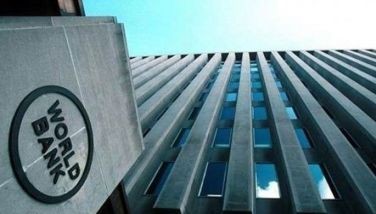Yap team dominates newly elected PSE board
March 11, 2001 | 12:00am
The Philippine Stock Exchange (PSE) elected yesterday its new set of governors for the year with the team headed by incumbent chairman Felipe Yap practically dominating the brokers’ list.
As required by law, the Exchange’s 184 members voted seven brokers into the 15-man board of governors while the eight non-broker majority earlier nominated were officially installed into office.
Aside from Yap, the other candidates who made it to the broker’s slate are former PSE chairmen Robert Coyiuto Jr. and Harry Liu, re-electionists Francis Chua, Vivian Yuchengco and David Go, and returning governor Eddie Gobing.
Yuchengco, of First Resources Management & Securities Corp. emerged as the top vote-getter with 100, followed by Yap (F. Yap Securities) and Coyiuto (R. Coyiuto Securities) with identical tally of 92 votes. Rounding up the brokers are Chua (BA Securities), Go (David Go Securities), Gobing (Lucky Securities) and Liu (Summit Securities), who head his own slate of broker candidates.
Completing the roster of the BOG are the non-brokers led by PSE president Ramon Garcia, SGV founder Washington Sycip, PLDT chairman Manuel Pangilinan, Ateneo president Fr. Joaquin Bernas, textile magnate Patricio Lim and the new recruits led by former Socioeconomic Planning Secretary Cayetano Paderanga, Benpres Holdings chairman Eugenio Lopez III and former Meralco president Mario Camacho.
The new board will convene on Wednesday to elect the new set of officers, including committee membership, for the current year.
In a press briefing, Yap said compared with the previous year when the new BOG had to hurdle the enormous challenge of veering away from the politics spawned by the BW Resources trading fiasco, this year’s new board now has to face the challenges of transforming into a demutualized bourse – also a requirement under the Securities Regulation Code – and moving it forward to global standards.
Under the SRC, the PSE has one year (or until Aug. 8, 2001) to complete its demutualization, which entails the conversion of the Exchange from an exclusive club to a stock corporation that will offer its shares to public ownership, or becoming a listed company similar to those being traded at the bourse at present.
"Perhaps a more important thing for us to do is be able to move the Exchange forward so the public, including the people in power, may know what the PSE really is all about. We should not only be on the defensive but on the offensive as well; we have to be transparent yet resolute in our drive to strengthen the PSE’s corporate structure. In this way, I think we can bring up our level of competitiveness along global lines," Yap said.
The new board, according to Yap, will also look at other areas for reforms, including a re-evaluation of the broker-dealer rule which under the SRC was prohibit except for certain circumstances.
"Some of the laws we have right now seemed to have been in reaction to the BW crisis, they were not ventilated in Congress," Yuchengco said. "I think they (the lawmakers) didn’t really understand the broker-dealer rule."
She added with the new administration, the PSE is hoping the government would be more receptive to a re-evaluation of the rules that she said have affected not only the brokers’ operations but the market’s performance as well.
At present, the PSE has the seventh lowest volume of trades in the world with a daily average of only about P300 million.
"We’re trying to get the ear of the new Secretary of Finance," Yuchengo said.
As required by law, the Exchange’s 184 members voted seven brokers into the 15-man board of governors while the eight non-broker majority earlier nominated were officially installed into office.
Aside from Yap, the other candidates who made it to the broker’s slate are former PSE chairmen Robert Coyiuto Jr. and Harry Liu, re-electionists Francis Chua, Vivian Yuchengco and David Go, and returning governor Eddie Gobing.
Yuchengco, of First Resources Management & Securities Corp. emerged as the top vote-getter with 100, followed by Yap (F. Yap Securities) and Coyiuto (R. Coyiuto Securities) with identical tally of 92 votes. Rounding up the brokers are Chua (BA Securities), Go (David Go Securities), Gobing (Lucky Securities) and Liu (Summit Securities), who head his own slate of broker candidates.
Completing the roster of the BOG are the non-brokers led by PSE president Ramon Garcia, SGV founder Washington Sycip, PLDT chairman Manuel Pangilinan, Ateneo president Fr. Joaquin Bernas, textile magnate Patricio Lim and the new recruits led by former Socioeconomic Planning Secretary Cayetano Paderanga, Benpres Holdings chairman Eugenio Lopez III and former Meralco president Mario Camacho.
The new board will convene on Wednesday to elect the new set of officers, including committee membership, for the current year.
In a press briefing, Yap said compared with the previous year when the new BOG had to hurdle the enormous challenge of veering away from the politics spawned by the BW Resources trading fiasco, this year’s new board now has to face the challenges of transforming into a demutualized bourse – also a requirement under the Securities Regulation Code – and moving it forward to global standards.
Under the SRC, the PSE has one year (or until Aug. 8, 2001) to complete its demutualization, which entails the conversion of the Exchange from an exclusive club to a stock corporation that will offer its shares to public ownership, or becoming a listed company similar to those being traded at the bourse at present.
"Perhaps a more important thing for us to do is be able to move the Exchange forward so the public, including the people in power, may know what the PSE really is all about. We should not only be on the defensive but on the offensive as well; we have to be transparent yet resolute in our drive to strengthen the PSE’s corporate structure. In this way, I think we can bring up our level of competitiveness along global lines," Yap said.
The new board, according to Yap, will also look at other areas for reforms, including a re-evaluation of the broker-dealer rule which under the SRC was prohibit except for certain circumstances.
"Some of the laws we have right now seemed to have been in reaction to the BW crisis, they were not ventilated in Congress," Yuchengco said. "I think they (the lawmakers) didn’t really understand the broker-dealer rule."
She added with the new administration, the PSE is hoping the government would be more receptive to a re-evaluation of the rules that she said have affected not only the brokers’ operations but the market’s performance as well.
At present, the PSE has the seventh lowest volume of trades in the world with a daily average of only about P300 million.
"We’re trying to get the ear of the new Secretary of Finance," Yuchengo said.
BrandSpace Articles
<
>
- Latest
- Trending
Trending
Latest






















